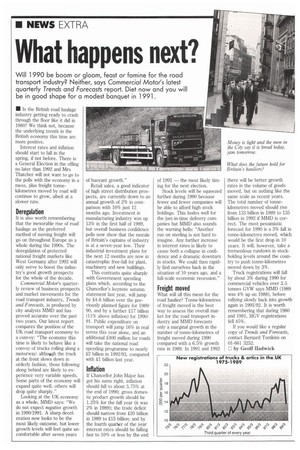What happens next?
Page 18

If you've noticed an error in this article please click here to report it so we can fix it.
Will 1990 be boom or gloom, feast or famine for the road transport industry? Neither, says Commercial Motor's latest quarterly Trends and Forecasts report. Diet now and you will be in good shape for a modest banquet in 1991.
• Is the British road haulage industry getting ready to crash through the floor like it did in 1980? We think not, because the underlying trends in the British economy this time are more positive.
Interest rates and inflation should start to fall in the spring, if not before. There is a General Election in the offing no later than 1992 and Mrs Thatcher will not want to go to the polls with the economy in a mess, plus freight tonnekilometres moved by road will continue to grow, albeit at a slower rate.
Deregulation
It is also worth remembering that the inexorable rise of road haulage as the preferred method of moving freight will go on throughout Europe as a whole during the 1990s. The deregulation of protected national freight markets like West Germany after 1992 will only serve to boost the industry's good growth prospects for the whole of the decade.
Commercial Motor's quarterly review of business prospects and market movements for the road transport industry, Trends and Forecasts, is produced by city analysts MMD and has proved accurate over the past two years. Our latest report compares the position of the UK road transport economy to a convoy: "The economy this time is likely to behave like a convoy of trucks rolling along a motorway: althowgh the truck at the front slows down in orderly fashion, those following along behind are likely to experience very variable speeds. Some parts of the economy will expand quite well, others will drop quite sharply."
Looking at the UK economy as a whole, MMD says: "We do not expect negative growth in 1990/1991. A sharp deceleration now looks to be the most likely outcome, but lower growth levels will feel quite uncomfortable after seven years of buoyant growth."
Retail sales, a good indicator of high street distribution prospects, are currently down to an annual growth of 2% in comparison with 10% just 12 months ago. Investment in manufacturing industry was up 13% in the first half of 1989, but overall business confidence polls now show that the morale of Britain's captains of industry is at a seven-year low. Their industrial investment plans for the next 12 months are now in catastrophic free-fall for plant, machinery and new buildings.
This contrasts quite sharply with Government spending plans which, according to the Chancellor's keynote autumn statement last year, will jump by £4.6 billion over the previously planned figure for 1989/ 90, and by a further £17 billion (11% above inflation) for 1990/ 91. Public expenditure on transport will jump 16% in real terms this year alone, and an additional £400 million for roads will take the national road spending programme to nearly billion in 1992/93, compared with billion last year.
Inflation
If Chancellor John Major has got his sums right, inflation should fall to about 5.75% at the end of 1990; gross domestic product growth should be 1.25% for the full year (it was 2% in 1989); the trade deficit should narrow from £20 billion in 1989 to £15 billion; and by the fourth quarter of the year interest rates should be falling fast to 10% or less by the end of 1991 — the most likely timing for the next election.
Stock levels will be squeezed further during 1990 because fewer and fewer companies will be able to afford high stock holdings. This bodes well for the just-in-time delivery companies but MMD also sounds the warning bells: "Another run on sterling is not hard to imagine. Any further increase in interest rates is likely to cause both a collapse in confidence and a dramatic downturn in stocks. We could then rapidly find ourselves back in the situation of 10 years ago, and a full-scale economic recession."
Freight moved
What will all this mean for the road haulier? Tonne-kilometres of freight moved is the best way to assess the overall market for the road transport industry and MMD forecasts only a marginal growth in the number of tonne-kilometres of freight moved during 1990 compared with a 6.5% growth rate in 1989. In 1991 and 1992 there will be better growth rates in the volume of goods moved, but on nothing like the same scale as recent years. The total number of tonnekilometres moved should rise from 133 billion in 1989 to 135 billion in 1992 if MMD is correct. The most pessimistic forecast for 1990 is a 3% fall in tonne-kilometres moved, which would be the first drop in 10 years. It will, however, take a tremendous rundown in stockholding levels around the country to push tonne-kilometres moved down by 3%.
Truck registrations will fall by about 3% during 1990 for commercial vehicles over 15 tonnes GVW says MMD (1989 was 4% up on 1988), before rallying slowly back into growth again in 1991/92. It is worth remembering that during 1980 and 1981, HGV registrations fell 45%.
If you would like a regular copy of Trends and Forecasts, contact Bernard Tomkins on 01-661 3252.
0 by Geoff Hadwick




































































































































